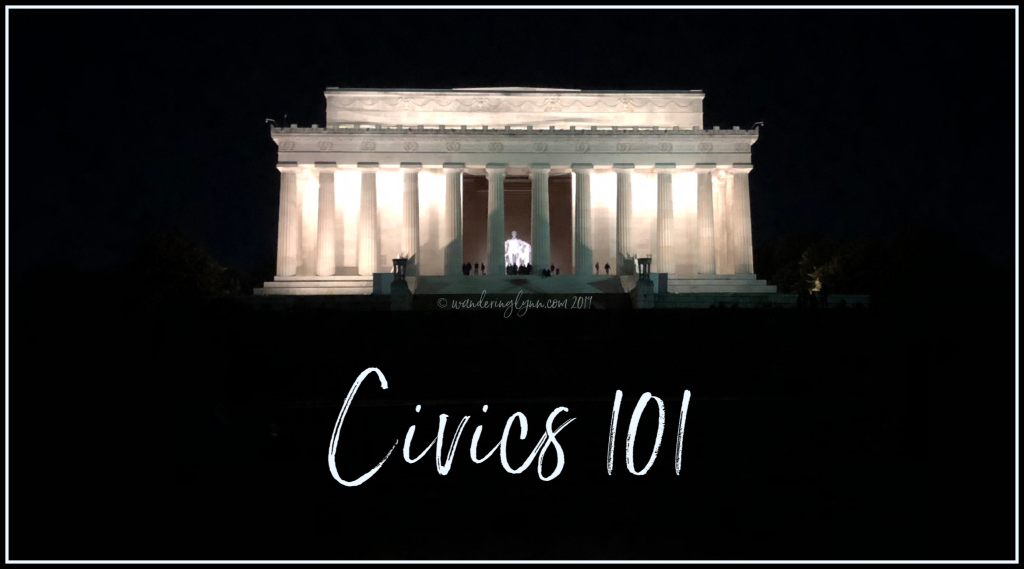Last week, I introduced my new Monday series: Let’s Talk About Civics. This series will be an ongoing conversation about civics, including how the U.S. Government works and the rights and duties of U.S. citizens.

To start off the series, today’s post is about civics fundamentals. A civics 101 if you will. This post focuses on the foundation of the U.S. Government (what ideas lay the foundation of the government) and the basics of the U.S. Government system.
For most of you who attended an American school, this is rather basic information you (hopefully) learned at some point. But we need to understand the basics before discussing the rights and obligations. And I hope this makes us all take another look at our government as well as generates some good conversation.
First, a small, but necessary disclaimer
I’m writing about these concepts in a brief, almost elementary way. This series of posts is in no way a comprehensive or complete discussion of civics but will simply provide a basic overview. I encourage everyone to do their own research. In fact, I will link to texts, documents, books, and other resources for your reference.
The practice of democracy is not passed down through the gene pool. It must be taught and learned anew by each generation of citizens.
Justice Sandra Day O’Connor
Civics is about the rights and obligations of citizenship at the local, state, national, and global levels. This series will focus on the national level, the U.S. federal government. But before we discuss the rights and obligations of citizenship, we have to understand the basics of government which grant these rights and obligations. So let’s start with the ideas at the foundation of our democracy.

Civics is about the rights and obligations of citizenship at the local, state, national, and global levels. This series will focus on the national level, the U.S. federal government. But before we discuss the rights and obligations of citizenship, we have to understand the basics of government which grant these rights and obligations. So let’s start with the ideas at the foundation of our democracy.
The Foundations of the U.S. Government
As long as men live without a common power to keep them all in awe, they are in the condition known as ‘war’; and it is a war of every many against every man.
Thomas Hobbes (1588-1679), Leviathan (1651)
There are many different types of governments such as monarchy, oligarchy, dictatorship, aristocracy, democracy. The U.S. is based on democracy.
Democracy comes from the Greek dēmos (the people) and -kratia (power, rule). The U.S. Government is actually not a pure democracy, but a type of democracy that is based on the idea of limited government with the principle of popular sovereignty.
A limited government is the belief that the government should have certain restrictions in order to protect the individual rights and civil liberties of its citizens. The U.S. government is limited by the Declaration of Independence, the Constitution, and the Bill of Rights (the first 10 amendments of the Constitution).
Being all equal and independent, no one ought to harm another in his life, health, liberty, or possessions.
John Locke (1632-1704), Second Treatise of Government (1689)
The concept of popular sovereignty is the idea that the government’s power comes from the will of the people or the “consent of the governed.” In other words, the idea was that if the government started to violate the will of the people, the people would have the right to change that.
From these concepts, we get the U.S. system of government—a democratic republic, a system in which the power to govern comes from the people through the representation of elected officials.
The U.S. System of Government
[We can keep government from becoming too powerful] by so contriving the interior structure of the government as that its several constituent parts may, by their mutual relations, be the means of keeping each other in their proper places.
James Madison (1751-1836), Federalist #51, The Federalist Papers (1788)
The U.S. system of government is composed of 3 branches: executive, legislative, & judicial.
- The executive branch, headed by the President, is charged with executing the laws and running the day-to-day functions of the government. One of the executive checks is that the President may veto legislation passed by the legislative branch.
- The legislative branch is composed of the House of Representatives and the Senate, generally known as “Congress.” Congress is charged with creating and passing laws. Congress also controls the budget and may override a Presidential veto.
- The judicial branch, with the Supreme Court as the highest tribunal in the Nation, is charged with interpreting the laws and deciding whether the laws and the decisions of the executive are Constitutional.
These 3 branches are meant to be independent, separate branches, each tasked in the Constitution with their own separate powers. The concept of separation of powers was so that one branch could not take over the other two. Yet while the 3 branches are separate, they are also interdependent and provide checks and balances on each other.
Resources & References
There are numerous references and books on the topics of civics, American political history, and the U.S. Government. I’ve provided a few above and here are a few more.
Additional resources for research and reference:
- The National Archives has a wealth of information and holds our nation’s most important documents, including the Declaration of Independence, the Constitution, and the Bill of Rights.
- The U.S. Citizenship and Immigration Services, which gives the naturalization test. There are 100 civics questions on the naturalization test.
- The Library of Congress has a wonderful digital collection, including the papers of Alexander Hamilton, James Madison, George Washington, and Abraham Lincoln.
- The National Museum of American History has wonderful exhibits and information on the founding of America.
In addition to Hobbes, Locke, and the Federalist Papers that I quoted above, here are a few others:
- The Prince by Niccolò Machiavelli
- The Republic by Plato
- The Basic Political Writings by Jean-Jacques Rousseau
- On Liberty, Utilitarianism and Other Essays by John Stewart Mill
- Democracy in America and Two Essays on America by Alexis de Tocqueville
- American Government 101 by Kathleen Sears
- The Everything American Government Book by Nick Ragone
- 1776 by David McCullough
- Americana: A Civics Handbook by Mary B. Mackley
And even some books for the kiddos (and you too):
- When You Grow Up to Vote: How Our Government Works for You by Eleanor Roosevelt (Author) with Michelle Markel (Author), Grace Lin (Illustrator)
- We the People: The Story of Our Constitution by Lynne Cheney (Author), Greg Harlin (Illustrator)
- We the Kids: The Preamble to the Constitution of the United States by David Catrow (Author, Illustrator)
- A More Perfect Union: The Story of Our Constitution by Betsy Maestro (Author), Giulio Maestro (Illustrator)
- How the U.S. Government Works by Syl Sobel
- I Dissent: Ruth Bader Ginsburg Makes Her Mark by Debbie Levy (Author), Elizabeth Baddeley (Illustrator)
- Turning Pages: My Life Story by Sonia Sotomayor (Author), Lulu Delacre (Illustrator)
Share your thoughts and book recommendations in the comments below.
* Links to products sold by Amazon.com are affiliate links. See my Terms of Use for more information on affiliate links.